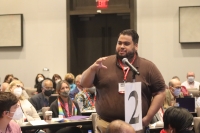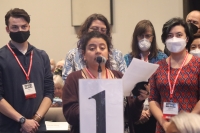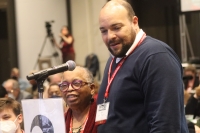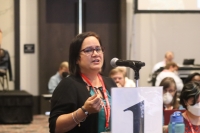news article
NEJ delegates share pain and witness on the sin of racism
November 8, 2022 / By Erik Alsgaard, Baltimore-Washington Conference
The Thursday (Nov. 3, 2022) afternoon plenary session of the NEJ dug deep into sharing the pain, anger, and sin of racism. For about two hours, delegates shared their thoughts and feelings in response not only to the “Call to Action” report given earlier that day, but also to the Episcopal Address given Wednesday by Bishop John Schol of the Greater New Jersey Area.
Lay delegates from the New England Conference came to the microphone seeking a point of personal privilege. While the Call to Action urged United Methodists to start a journey toward anti-racism with small steps on a journey of 1,000 miles, the delegates noted that small steps are not enough and that African Americans were not, and are not, the only people of color who have suffered racism.
No one can fully comprehend the pain that 400 years of slavery can leave in one’s spirit, they said. However, Asian and Latinx people have also been harmed, they said, and the very land we were meeting on was stolen from Native American people.
“It is still happening,” they said. “The reports of the Episcopal Address and the Call to Action continue to ignore us.”
“I still have a lot to learn,” said Bishop Schol, who was in the chair for the session. “Part of what we’re hearing, in my estimation, is the continual failure of white people to end racism, and how by our actions or inactions, we keep people of color comparing to one another. I may be wrong, but that is one of the things that I see and watch.”
He then added, “I just want to give a little room in our agenda today for people who feel they want to bear a witness to go to a microphone and share your heart.”
And they did.
One by one, or in small groups, NEJ delegates came forward to pour out their stories and experiences, their thoughts and feelings.
Ian Urriola, lay delegate from the Upper New York Conference, said that the problem is “whiteness … it’s white supremacy. I need to exorcise and cut out the whiteness in me. Every delegate needs to cut out the whiteness.” He also noted that the Call to Action report showed what Annual Conferences were doing, “but not what the Jurisdiction is doing.”
What, he asked, “is the Northeastern Jurisdiction doing to divest itself from whiteness?”
The Rev. Sandra Bonnette-Kim, from the New England Conference, said that this was not about “my pain being more than your pain. The real issue is that we’re not seen, not recognized, not valued.”
She urged people to stop fighting one another.
“Let’s embrace one another,” she said, “not discard one another.” A native of Puerto Rico, Bonnette-Kim noted that “we turn against each other because of what Colonialism has done to us. It is ingrained; we just do it; we don’t think about it.”
The Rev. Joe Hill, from the West Virginia Conference, said that whiteness also does harm to white communities. “It’s toxic to the whole family of God,” he said.
At the end of his sharing, he broke into a sung prayer with one word in it: Jesus. We’re not trying to convince Jesus to come but to remind us where our focus should be,” he said in introducing it.
Fred Brewington, a lay delegate from the New York Conference, said that the United States today is the product of systems and institutions “that I often refer to as an octopus of a quagmire.”
Part of his work, he said, requires him to stand and advocate for people.
“I stand before you as an African American man who can’t go back more than three levels of my family tree,” he said. “But I know, that unless we look to a much higher power, we will be trapped by the systems that are created to keep us down.”
Don’t be afraid to have these difficult conversations, he said.
“It is painful, but it is necessary,” he said. “Because the rest of the world doesn’t want us to talk about our Asian brothers and sisters. They want me to think that what they experienced is not important. It is.”
Sharon Milton, a lay delegate from the Baltimore-Washington Conference, said that she rose to speak against every system of oppression for every race and every color.
“I’m speaking as a Black woman who has worked with Black youth,” she said. “When people speak about oppression, I want you to understand that they come to church knowing that their 16-year-old friend was lost to gun violence. The reality of the situation is that, every day, children are dying and it’s become the norm. I’m holding you accountable for what you’ve written on paper … but faith without works is dead.”
The Rev. Giovanni Arroyo, delegate from the Baltimore-Washington Conference, who serves as the General Secretary of the General Commission on Religion and Race, said he came to the microphone in that capacity.
“I come hearing the pain in this room,” he said. “I know the importance of sacred space, to hear the pain and the trauma. I think its harmful to open the space and not continue the journey.”
With that, he invited the NEJ College of Bishops and the NEJ Vision Table to partner with GCORR to determine direction “so that when we gather in 2024, knowing our stories, we can address the systemic and institutional barriers of racism together. I invite you to walk with me.”
Bishop Schol said that he looked forward to that partnership and to continue the work begun here.
The session ended with Bishop Schol inviting Rev. Hill to lead the conference in singing the Jesus prayer.



